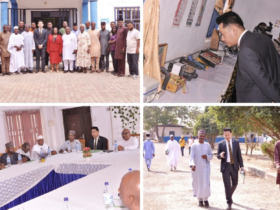SINGAPORE, Sept 14 — Malaysia’s combination of fortune in the form of natural resources and its own efforts through policies and diplomacy has positioned the country to emerge as a consequential middle power, according to political analyst James Chai.
In a commentary titled “Malaysia has something great powers want”, published on Sept 12 by CNA, Chai argues that the ball is now in Malaysia’s court to make the most of it.
“Leverage, in international politics, is determined by who needs whom more. It is unusual for a middle state like Malaysia to hold assets that great powers want,” he wrote.
Chai highlighted that Chinese President Xi Jinping’s first visit to Malaysia since 2013, which took place last April, came less than a fortnight after US President Donald Trump unveiled the “Liberation Day” reciprocal tariffs.
Malaysia, notably, held the ASEAN chair and served as Country Coordinator for ASEAN-China Dialogue Relations.
“In a time of geopolitical uncertainty, it was clear Mr Xi wanted to position China as Malaysia’s most dependable trade partner – one that acts on win-win outcomes and mutual trust,” Chai wrote.
He noted that not only did China and Malaysia ink 31 memorandums of understanding across several areas, but, most importantly, it was revealed later that Xi had offered to help Malaysia develop its rare earth processing capabilities.
Chai said this is significant, as Malaysia’s discovery of 16.2 million metric tonnes of rare earth deposits worth an estimated US$175 billion and potential access to Chinese technology for the complex, multi-stage separation process – is akin to holding the master key to the vault.
“If its cooperation with China materialises, Malaysia might create a two-track rare earth ecosystem – one with Chinese technology and another with Australian firm Lynas, which has a rare earth processing plant in Pahang,” he said.
Chai said this means that, in the coming years, Malaysia could become a battleground in the global race for rare earths – courted by great powers, but beholden to none.
He noted that rare earths have skyrocketed in importance due to their ubiquity in core technologies such as data centres, mobile phones, electric vehicles, robotics, and semiconductor equipment.
He said they also carry significant geopolitical weight. China, which holds a near-monopoly on rare earth refining and processing, has used this as leverage in tariff talks with the US.
Meanwhile, Chai said Malaysia will remain a critical hub for semiconductors, particularly because of its role in backend assembly, testing, and packaging.
“The world felt, for the first time, Malaysia’s centrality in backend assembly, testing, and packaging during COVID-19, when the country’s lockdown halted production at Toyota, Ford, Nissan, and General Motors,” he said.
Malaysia accounts for 13 per cent of global backend chip production and seven per cent of the global market, and supplies around 20 per cent of US semiconductor imports.
He said that geographically, Malaysia holds further advantage. The Strait of Malacca is a global trade chokepoint, with 25 per cent of the world’s traded goods and 60,000 annual vessels passing through.
He added that, compared to its regional peers, Malaysia is well-positioned to benefit from shifting global trade dynamics.
“The Economist recently argued that Malaysia is likely to emerge as one of the winners in Trump’s tariff offensive. Key reasons include more favourable tariff differentials, lower transshipments, and lower reliance on American demand,” he wrote. – Bernama



















Leave a Reply